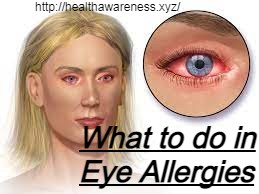What to do in Eye Allergies
What is allergy?
When the body comes into contact with any substance harmful to the body, such as flower pollen, pet hair or shedding or animal dander, dander, cosmetic or perfume-like chemicals; Or when a virus or bacterial pathogen enters the body, the body tries to fight it off. These harmful substances or agents are called allergens. Although allergies are a form of suffering, they are actually protective for the body. No allergen is equally allergenic to everyone.
Eye allergy
When allergens first enter the body, the body's immune system produces a type of antibody called Ig-E. This Ig-E reacts with white blood cells called mast cells to create a type of sensitivity. Later, when the same allergen enters the body again, it causes a severe reaction in the body. Allergens, especially pollen or dust, easily come into contact with the mucous membrane or conjunctiva that lines the surface of the eye. Symptoms include itchy eyes, burning eyes, watery eyes, etc. Sometimes the nose and airways can be affected by the same process.
Seasonal allergies
Seasonal allergies are usually caused by pollen, dust, etc. Immediate symptoms are of moderate intensity and short duration. The good eye is suddenly affected with itching, followed by redness and swelling within a short period of time. This type of allergy is more common especially in spring. This time is very difficult for sensitive people.
Warning
Sunglasses can help a bit to avoid exposure to airborne flower molecules. After returning home, change clothes and wash hands and face quickly. The floor of the house should be kept clean. If there is a flower garden around, keeping the window closed is beneficial. Avoid direct flower garden maintenance.
Treatment
Olopatadine-like drops are very beneficial. Sometimes the use of steroid-like drops may be necessary. Artificial tears help keep the eyes somewhat protected from allergens. Antihistamine tablets, such as fexofenadine, may also provide some benefit. Ophthalmologist must be consulted in case of drug use.

Post a Comment